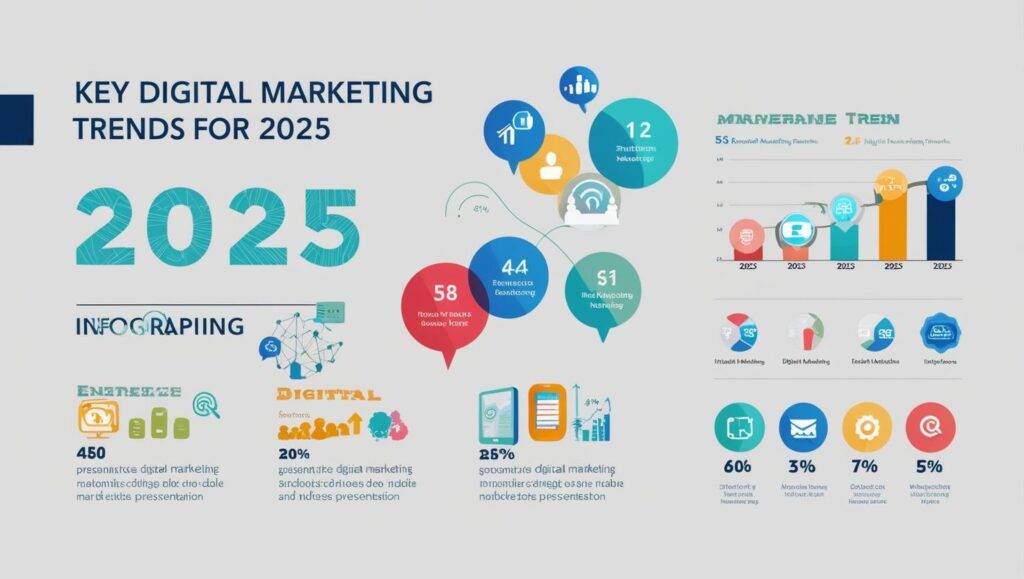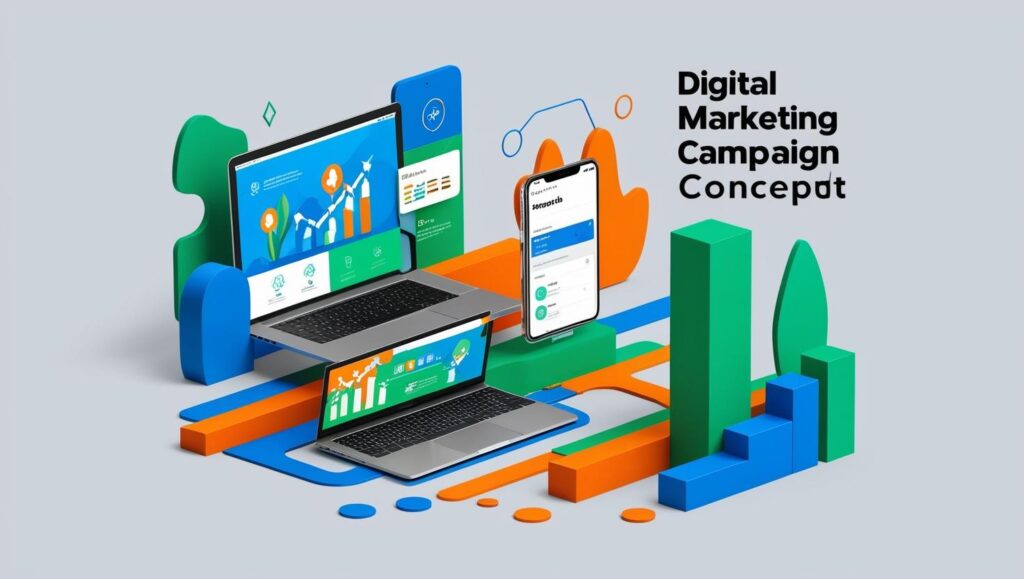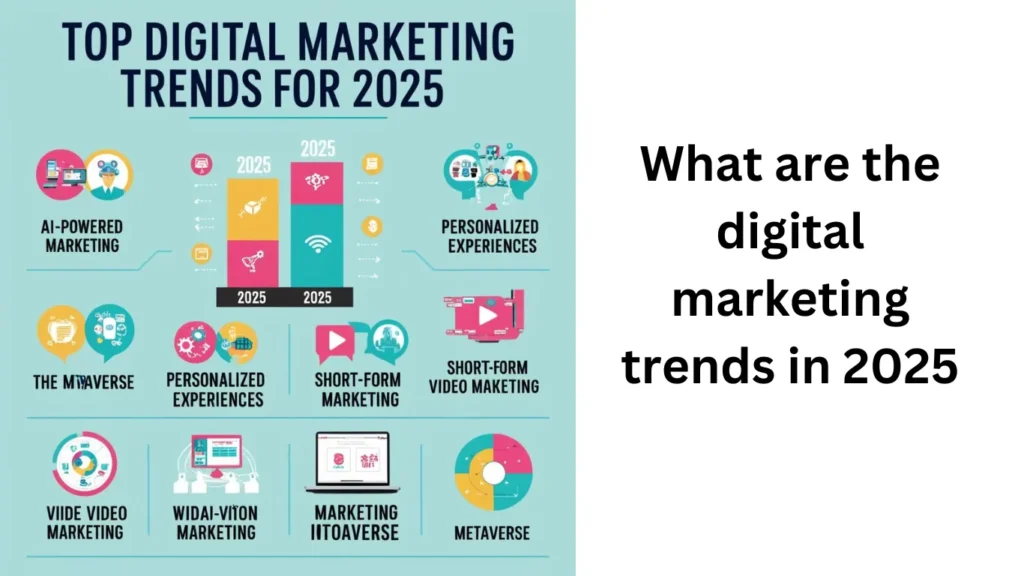The pace of change in digital marketing is unprecedented, and with each passing day, it promises to get better up to 2025. A marketer will have to stay one step ahead due to rapid changes in technology and consumer behavior, along with new emerging platforms. These will, in turn, help established brands and marketing agencies develop appropriate strategies that guarantee their long-term success in the digital marketing space of 2025.
With that said, let’s proceed to discuss what the most in-demand digital marketing trends would be by 2025. Increased usage for AI marketing or more personalization-whatever the trend might be, the following surely are going to set a standard as to how brands would speak to their customers for the coming years.
1. Artificial Intelligence and Machine Learning

While AI has already begun the revolution in digital marketing, in 2025 it would still be on the first lines for far more advanced automation, personalization, and analysis of data. Later, even marketing agencies and established brands would have joined the battle with the heavy involvement of dependence on AI tools in upgrading efforts concerning customer targeting, foreseeing consumer behaviors, and creating content on automatic.
The development of AI-powered solutions will further develop, such as chatbots, predictive analytics, and recommendation engines. This allows marketers to create hyper-personalized experiences, driving customer satisfaction and engagement higher than ever before.
Key Takeaways:
AI will unlock deeper data insights that will help brands understand their customers’ preferences and predict future behavior.
Chatbots and AI assistants will continue to further evolve to human-like states, allowing real-time personalized communication.
Predictive tools will make the marketing campaigns wiser in advance by anticipating customer needs even before they arise.
2. Hyper-Personalization at Scale
The modern-day consumer wants to feel personalized, and in 2025, this is going to touch new highs. Brands will be using AI with rich analytics to offer hyper-personalized content and product recommendations, making every interaction per the use of the user’s behavior, preference, and purchase history.
But personalization in 2025 will go much beyond just adding someone’s name to emails or suggesting particular types of products. It is frictionless, personalized journeys across each touchpoint, from website experiences to social media ads, personalized video content, and more.
Key Takeaways:
Advanced segmentation and dynamic content delivery can enable brands to develop hyper-personalized marketing campaigns.
AI and machine learning take brands one step further in knowing what they want at just the right time. These are data protection considerations that will continue being paramount in the future, in which consumers must have more and more control over their information.
3. Voice Search and Conversational Marketing
Over the years, voice search has been growing but, in the year 2025, is considered one of the major contributors to digital marketing. Due to an increase in using voice assistants, including Amazon Alexa, Google Assistant, and Apple Siri among others, even marketers will optimize the content for voice search queries.
AI-driven conversational marketing through chatbots and messaging will continue to grow. Consumers will want to have brands speak with them through Live Chat, Social Media DMs, or Messaging Apps, and marketers will have to have a strategy for two-way conversations in real time.
Key Takeaways:

Brands will need to optimize for natural language search and conversational queries.
Conversational marketing platforms will be deployed to deliver personalized, immediate responses that enhance customer engagement.
The marketers would focus on ensuring speed as far as solutions and answers via voice-enabled devices are concerned.
4. Video Marketing to Continue Dominating
Video content has dominated digital marketing for a couple of years in a row, and by 2025 it will surely be more dominating. Consumption in this regard will increase with the help of short-form video, live streaming, and other interactive forms of video format. It will be the year when TikTok, YouTube, and Instagram Reels rule the roost.
They will want brands to create more authentic, engaging video content around topics of interest and issues that are of importance to them-that is, less commercial but more user-generated and influencer content.
Key Takeaways:
Short-form video and live streaming will be key drivers of consumer engagement in 2025.
Authenticity will become bigger th8an ever; the consumers are looking for real, unfiltered brand messaging.
Interactive video will be used by the brands for conversion and, for instance, with shoppable content.
5. Augmented Reality and Virtual Reality
No more something of the future, augmented reality and virtual reality are officially a marketing reality. By 2025, AR and VR will take the shape of immersive experiences that allow consumers to deal with the products online, just like in virtual shops, in order to create better shopping experiences online.
Fashion brands, for example, will be able to use AR so that customers virtually try on clothes and see in advance what a particular piece of furniture from them might look like in their living room before purchase. These experiences will only up the interactions but also increase the conversions.
Key Takeaways:
AR and VR are going to become much more fundamental to creating interactive eCommerce product demonstrations and virtual try-ons.
These will further catalyze consumer involvement by creating immersive brand experiences.
In an over-cluttered market, the brands using AR/VR do stand a chance of emerging from the fray.
6. Sustainability and Social Responsibility
By 2025, the interest in the sustainability and social responsibility of consumers will be very high. In such a dynamic world as today, with each passing day, through the marketing strategy, established brands together with their advertising agencies will have to convey an environmental and social commitment.
From green packaging to charitable initiatives, the values and subsequent actions of a brand will need to be communicated transparently. Companies perceived as actually living sustainability as part of their brand ethos garner trust and loyalty from the conscious consumer.
Key Takeaways:
Brands will need to bake in sustainability and social responsibility into the marketing messaging.
Consumers will continue to favor brands whose values resonate with their own and that show authentic efforts to drive positive change.
Besides, marketing campaigns will shift to top branding of social and environmental causes of a brand.
7. Privacy and Data Protection
While growth of privacy concern is on, regulations like GDPR and CCPA are forcing brands to be more transparent while collecting data and using it. More critical in 2025, data privacy will prove to be crucial, and marketers must fight hard to get consumers’ trust by building up their policies for better privacy.
The consumer will still want the brand to safeguard their personal information as they continue to offer experiences that are personalized. Additionally, the marketer will also have to balance using consumer data while showing respect for privacy in order to maintain consumer trust and adhere to global regulations.
Key Takeaways:
Marketers must make privacy, transparency, and compliance with data protection laws a priority.
Consumer trust will become a key differentiator among brands, separated by who truly protects data.
Brands will be compelled to be open about consumer data collection, storage, and usage.
Conclusion
Coming 2025, watch out for some exciting changes in digital marketing. These will, no doubt, enable established brands and marketing agencies to position themselves for success within the rapidly changing landscape. From AI-powered personalization to immersive AR experiences, staying ahead of these trends is going to be a surefire way to forge long-lasting relationships with consumers and fuel business growth.

